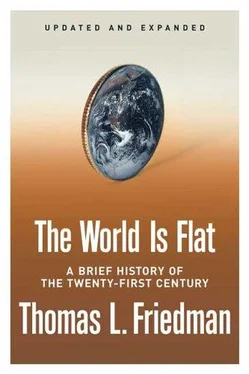Do worry, though, about the 20 low-skilled Americans, who now have to compete more directly with the 920 low-skilled Chinese. One reason the 20 low-skilled Americans were paid a decent wage before was that, relative to the 80 skilled Americans, there were not that many of them. Every economy needs some low-skilled manual labor. But now that China and America have signed their free-trade pact, there are a total of 940 low-skilled workers and 160 knowledge workers in our two-country world. Those American low-skilled workers doing fungible jobs-jobs that can easily be moved to China-will have a problem. There is no denying this. Their wages are certain to be depressed. In order to maintain or improve their living standards, they will have to move vertically, not horizontally. They will have to upgrade their education and upgrade their knowledge skills so that they can occupy one of the new jobs sure to be created in the much expanded United States-China market. (In Chapter 8 I will talk about our society's obligation to ensure that everyone gets a chance to acquire those skills.)
As Romer notes, we know from the history of our own country that an increase in knowledge workers does not necessarily lead to a decrease in their pay the way it does with low-skilled workers. From the 1960s to the 1980s, the supply of college-educated workers grew dramatically, and yet their wages grew even faster. Because as the pie grew in size and complexity, so too did people's wants, and this increased the demand for people able to do complex work and specialized tasks.
Romer explains this in part by the fact that “there is a difference between idea-based goods and physical goods.” If you are a knowledge worker making and selling some kind of idea-based product-consulting or financial services or music or software or marketing or design or new drugs-the bigger the market is, the more people there are out there to whom you can sell your product. And the bigger the market, the more new specialties and niches it will create. If you come up with the next Windows or Viagra, you can potentially sell one to everyone in the world. So idea-based workers do well in globalization, and fortunately America as a whole has more idea-driven workers than any country in the world.
But if you are selling manual labor-or a piece of lumber or a slab of steel-the value of what you have to sell does not necessarily increase when the market expands, and it may decrease, argues Romer. There are only so many factories that will buy your manual labor, and there are many more people selling it. What the manual laborer has to sell can be bought by only one factory or one consumer at a time, explains Romer, while what the software writer or drug inventor has to sell—idea-based products-can be sold to everyone in the global market at once.
That is why America, as a whole, will do fine in a flat world with free trade-provided it continues to churn out knowledge workers who are able to produce idea-based goods that can be sold globally and who are able to fill the knowledge jobs that will be created as we not only expand the global economy but connect all the knowledge pools in the world. There may be a limit to the number of good factory jobs in the world, but there is no limit to the number of idea-generated jobs in the world.
If we go from a world in which there were fifteen drug companies and fifteen software companies in America (thirty in all) and two drug companies and two software companies in China (four in all) to a world in which there are thirty drug and software companies in America and thirty drug and software companies in China, it is going to mean more innovation, more cures, more new products, more niches to specialize in, and many more people with higher incomes to buy those products.
“The pie keeps growing because things that look like wants today are needs tomorrow,” argued Marc Andreessen, the Netscape cofounder, who helped to ignite a whole new industry, e-commerce, that now employs millions of specialists around the world, specialists whose jobs weren't even imagined when Bill Clinton became president. I like going to coffee shops occasionally, but now that Starbucks is here, I need my coffee, and that new need has spawned a whole new industry. I always wanted to be able to search for things, but once Google was created, I must have my search engine. So a whole new industry has been built up around search, and Google is hiring math Ph.D.'s by the bushel-before Yahoo! or Microsoft hires them. People are always assuming that everything that is going to be invented must have been invented already. But it hasn't
“If you believe human wants and needs are infinite,” said Andreeseen, “then there are infinite industries to be created, infinite businesses to be started, and infinite jobs to be done, and the only limiting factor is human imagination. The world is flattening and rising at the same time. And I think the evidence is overwhelmingly clear: If you look over the sweep of history, every time we had more trade, more communications, we had a big upswing in economic activity and standard of living.”
America integrated a broken Europe and Japan into the global economy after World War II, with both Europe and Japan every year upgrading their manufacturing, knowledge, and service skills, often importing and sometimes stealing ideas and equipment from the United States, just as America did from Britain in the late 1770s. Yet in the sixty years since World War II, our standard of living has increased every decade, and our unemployment rate-even with all the outcry about outsourcing— stands at only a little above 5 percent, roughly half that of the most developed countries in Western Europe.
“We just started a company that created 180 new jobs in the middle of a recession,” said Andreessen, whose company, Opsware, uses automation and software to replace human beings in the operation of huge server farms in remote locations. By automating these jobs, Opsware enables companies to save money and free up talented brainpower from relatively mundane tasks to start new businesses in other areas. You should be afraid of free markets, argued Andreessen, only if you believe that you will never need new medicines, new work flow software, new industries, new forms of entertainment, new coffeehouses.
“Yes,” he concluded, “it takes a leap of faith, based on economics, to say there will be new things to do.” But there always have been new jobs to do, and there is no fundamental reason to believe the future will be different. Some 150 years ago, 90 percent of Americans worked in agriculture and related fields. Today, it's only 3 or 4 percent. What if the government had decided to protect and subsidize all those agricultural jobs and not embrace industrialization and then computerization? Would America as a whole really be better off today? Hardly.
As noted, it is true that as Indians or Chinese move up the value chain and start producing more knowledge-intensive goods-the sorts of things Americans have been specializing in-our comparative advantage in some of these areas will diminish, explains Jagdish Bhagwati, the Columbia University expert on free trade. There will be a downward pressure on wages in certain fields, and some of the jobs in those fields may permanently migrate abroad. That is why some knowledge workers will have to move horizontally. But the growing pie will surely create new specialties for them to fill that are impossible to predict right now.
For instance, there was a time when America's semiconductor industry dominated the world, but then companies from other countries came along and gobbled up the low end of the market. Some even moved into the higher end. American companies were then forced to find newer, deeper specialties in the expanded market. If that weren't happening, Intel would be out of business today. Instead, it is thriving. Paul Otellini, Intel's president, told The Economist (May 8, 2003) that as chips become good enough for certain applications, new applications pop up that demand more powerful and more complex chips, which are Intel's specialty.
Читать дальше












